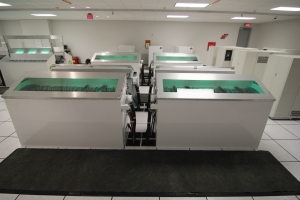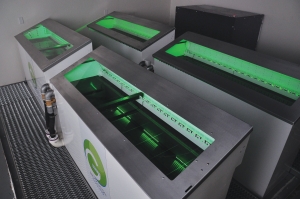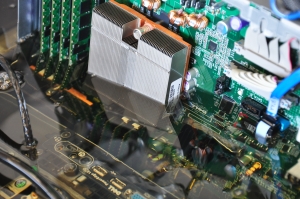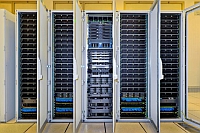|
|
> > L'Actu des membres et partenaires >CLUSTERVISION
 |
7 décembre 2015 -
Présent sur le territoire français depuis une dizaine d'année, ClusterVision est fier d'avoir inauguré ses nouveaux bureaux à Bordeaux. Depuis la capitale girondine, l'équipe française s'investira sur les projets en France mais également dans le sud de l’Europe. Soucieux de développer ses équipes locales, ClusterVision continuera de s'inscrire durablement dans le paysage français du Calcul Haute Performance.
Nouvelles installations de Cluster
Dans sa volonté de se doter d'outil de calcul à la hauteur de ses ambitions, l'Université de Magdeburg se munit d'un Cluster de 3000 cœurs Intel Haswell. Connecté à l’aide d’un réseau Infiniband QDR Intel Truescale, celui-ci est également équipé d’un système de stockage BeeGFS de 320To.
Pour gérer ce cluster, l'université a opté pour la solution open source ClusterVision basée sur OpenStack Trinity.
Après plusieurs installations réussies, Volvo IT et ClusterVision ont décidé de continuer leur collaboration pour l'installation d'un nouveau cluster.
Cette fois ci, ce sont plus de 700 coeurs qui ont été assemblés dans le centre de Gothenburg et qui apporteront aux chercheurs de nouvelles perspectives en termes de calcul.
Plus grand institut de recherche au monde dédié à l'étude de la relativité, l'Institut Max Planck s'est doté d'un nouveau cluster de 9500 cœurs répartis sur plus de 600 nœuds. Ce cluster sera équipé du nouveau réseau rapide d’Intel Omni-Path ainsi que d’un système de stockage BeeGFS de 500 To.
Ce cluster situé à Potsdam permettra aux différentes équipes de chercheurs d'avoir des outils de calcul à la hauteur de leurs ambitions. |
 |
Trinity apporte un gain de performance, ainsi que la flexibilité du Cloud à votre cluster HPC. Vous pouvez désormais attribuer vos ressources matérielles à différents projets et utilisateurs et administrer vos clusters virtuels de manière totalement indépendante et sécurisée.
:
La puissance du HPC :
- Scalabilté jusqu’à plusieurs dizaines de milliers de nœuds
- Compatible avec tous les matériels (IPMI, InfiniBand, PXE)
- Couche HPC complète (Ordonnanceur de travaux, bibliothèques MPI & scientifiques, compilateurs, debuggers)
- Ordonnanceur- SLURM
- Bibliothèques MPI- OpenMPI, Intel MPI, MVAPICH, MPICH2
- Compilateurs - GNU et Intel
- Aucune perte de performance (containerisation basée sur Docker)
- Equilibrage de charge sur les partitions du cluster
L’agilité du Cloud :
- Contrôle optimal et total de l’environnement pour les utilisateurs
- Gestion et mesure d’activité optimisée (Interface OpenStack)
- Permet aux utilisateurs d’héberger leur propre cloud privé ou publique (Infrastructure Informatique globale, cycles de ventes)
- Possibilité de repartitionner rapidement le cluster en fonction de l’évolution des demandes internes
|
 |
| September 2, 2014 - Austrian Consortium places order for Top 500 highly energy efficient supercomputer based on Mineral Oil Cooling with ClusterVision
A number of prominent Austrian research organisations, including amongst others the University of Vienna and the Vienna University of Technology, have joined forces to create the Vienna Scientific Cluster (VSC-3) project. Most noteworthy is the consortium's special emphasis on energy efficiency, with the ambition to put Austria’s most powerful supercomputer at the forefront of the Green 500, a respected ranking of the most energy efficient supercomputers in the world. ClusterVision, together with Green Revolution Cooling, Intel and Supermicro, form the winning solution.
 |
 |
This optimised solution for the VSC-3 provides considerable reductions to the overall cost of the data centre in several ways. First, by almost eliminating power consumption for air-cooling down to 5%, which yields a 50% drop in total energy consumption at the data centre level. This innovative approach can also take capital expenditure down to 60% for the infrastructure and installation costs due to the elimination of expensive cooling equipment typically used in conventional data centres such as chillers and HVAC units, and by omitting the need for architectures such as raised flooring and airflow aisles. In addition, due to the absence of chassis fans and power supply fans in the servers, another 10-20% less power is used in the system. Current Leakage at the processor level is also reduced in the submersion cooling environment, resulting in less wasted server power. ClusterVision’s skinless server design further improved the power and cost efficiency of the installation by replacing expensive chassis while simultaneously optimising the flow of the cooling fluid. These unique improvements are the core of cost savings and how ClusterVision, together with GRC, are able to provide the VSC with a highly effective new cluster that maximizes computational output.
 |
The VSC-3 system configuration comprises 2070 nodes based on Supermicro's green X9DRD-iF board range, each with 2 Intel Xeon E5-2650 v2 processors with 8 cores each running at 2.6GHz. The smaller compute nodes have 64 GByte of main memory per node, whilst the larger nodes are enhanced with up to 256 GByte of main memory. The system is controlled with 4 management and administration nodes. Users access the cluster via 5 login nodes. To ensure fast deployment of the high number of compute nodes, the system includes 2 dedicated deployment servers. Due to the very high inter-node communication demands, the interconnect system is based on Intel's Truescale QDR80 design |
The collaboration between ClusterVision and the consortium is growing on the foundations of strong personal relations, frequent and open communications, and mutual enthusiasm for this extremely exciting project. The partnership is set to grow over time, fuelled by the desire to lead the race in energy-efficient computing, and to form a common voice to the HPC market as a whole.
|
 |
29 janvier 2014 - ClusterVision a reçu une commande de l'Université de Vienne pour un cluster basé sur la technologie de refroidissement GRC (Green Revolution Cooling).
Specs Technique: 585 TFLOPS, 700TB stockage à 20 GB/s. En parallèle ClusterVision a reçu une commande du STFC au UK pour un cluster basé aussi sur la technologie à base d'huile minérale de GRC. |
 |
29 janvier 2014 - Dell, Intel et ClusterVision inaugurent la nouvelle infrastructure du Service de Calcul Parallèle et d'Analyse de Données (S-CAPAD) à l'IPGP
Sous le haut patronage de l’Institut de Physique du Globe de Paris (IPGP), Dell, Intel et ClusterVision inaugurent le Vendredi 14 février 2014 la nouvelle infrastructure du Service de Calcul Parallèle et d'Analyse de Données (S-CAPAD) à l'IPGP. |
 |
02.09.2013 - L’Institut de Physique du Globe de Paris a lancé fin 2012 une consultation concernant l’acquisition d’une solution haute performance de calcul parallèle et d’analyse
intensive de données.
Cette solution devait être clé en main et intégrer le matériel, les logiciels, l’installation, la formation, la maintenance, la garantie et le support sur 5 ans.
ClusterVision a remporté ce projet en collaboration avec Dell. Voici les détails de notre solution :
- 96 nœuds de calcul intensif C6620
- 16 nœuds de traitement de données R720xd
- 4 nœuds Hybrides GPU
- 576 To de stockage utile avec un système de fichier GPFS
- Un réseau InfiBand Intel TrueScale non bloquant
- Le logiciel d’administration de grappe de calcul Bright Cluster Manager
- Un support complet de 5 ans avec comme point de contact unique ClusterVision
La performance crête est d’environ 40Tflops. Le détail technique est disponible sur le site public de l’IPGP : http://www.ipgp.fr/rech/scp/Ressources/ClusterVision.php |
 |
| ClusterVision Achieves NVIDIA Tesla Preferred Provider
With acceptance into the select group of NVIDIA® Tesla™ Preferred Providers (TPP), ClusterVision has further strengthened its position as one of Europe’s leading HPC providers, now including specific expertise in the design, build and support of GPU accelerated cluster systems based on NVIDIA’s Tesla K10 and Tesla K20 technology.

|
 |
| ClusterVision is Dell Premier Partner in the UK
With the addition of the United Kingdom, ClusterVision has now completed accreditation as a Dell Premier Partner in each of its major focus geographies, namely the Netherlands, Germany, France and the United Kingdom. A formal announcement and commencement is scheduled for the start of Dell’s quarter in February 2013.

|
 |
Remote System Administration
Remote System Administration offers a secure and professional cluster management service for all ClusterVision customers, relieving the resource burden and cost of in-house cluster operation. Read more about our RSA work packages.
 |
 |
ClusterVision Prepaid Service Credits
ClusterVision have announced the availability of an easy to use way of purchasing and consuming ClusterVision Professional Services. Prepaid Service Credits are a flexible and convenient way to further extend and customise your existing support environment.
 |
 |
Cluster Management for Financial Risk Applications
ClusterVison is supplying a combined software and services solution to leading French software provider Murex, to manage its GPU cluster based in Paris. The Cluster is used to develop software applications for the world's financial markets.
 |
 |
CRP Gabriel Lippmann Extends Cluster
ClusterVision has worked with pioneering scientific research centre CRP-GL to extend its HPC cluster. The extended cluster provides a powerful environment for the scientific community, driving applications in climatology, medical research and manufacturing.
 |
 |
HPC Integration Services for Renewable Energy Leader
ClusterVision has completed the integration and management environment of a new HPC compute cluster at EMD International A/S, a world leader in commercial software development and consultancy solutions for renewable energy production. The project involved ClusterVision providing the integration and management services as part of a joint customer solution with Dell.
 |
 |
Accelerators/Coprocessors
Supercomputing Conference (SC12) in Salt Lake City, USA, saw the public launch of a wide variety of new HPC technologies. ClusterVision take a look at some of the much anticipated acceleration technologies which were officially announced at SC12 by NVIDIA, AMD and Intel.
 |
 |
Next Generation High-Density HPC Servers
This summer has seen some exciting announcements on the evolution of next generation high-density HPC servers based on the Intel® Xeon® E5-2600 product family. We take a look at some of the latest developments from Intel, Supermicro and Dell.
 |
 |
AMD Opteron 6300 Series Processors
Early November saw the official launch of Advanced Micro Devices’ (AMD) next generation of AMD Opteron 6300 processors. The AMD Opteron 6300 series, often referred to by its code name “Abu Dhabi” is based on AMD’s new Piledriver core technology.
 |
 |
New 38.8 Tflops Cluster Opens at the University of Bordeaux
Bordeaux, France, 06 December 2011 — ClusterVision, specialist in high performance compute, storage and database clusters, has announced the formal opening of “Avakus”, the new University of Bordeaux HPC Cluster. The 38.8 Tflops (38852 Gflops) supercomputer is installed at the Université Bordeaux 1 Sciences et Technologies IT facility in Talence, France, and will provide valuable computing resources to the scientific and academic communities of the Aquitaine region.
Supported by the Aquitaine Regional Council with financial backing from the European Union and the European Regional Development Fund, the Bordeaux HPC cluster is the result of a close consortium of academic, commercial, and technology partners, including collaborative contributions from the PRES Université de Bordeaux, the Université Bordeaux-1, the Université Segalen Bordeaux 2, Université de Pau et des Pays L’Adour, the Institute Polytechnic of Bordeaux, the CNRS and INRIA. ClusterVision provided the lead for the technology partnership, coordinating systems, software and service components from Dell, Intel, Qlogic, NVIDIA, and others.
The opening ceremony, which took place on Friday 25 November in the magnificent Agora Hall of the University of Bordeaux 1, attracted over 200 guests from the French HPC community and beyond. In a pre-opening event, VIP guests also gathered to discuss their involvement in the project and to sample the fine cuisine and wines of the Bordeaux region.
The formal cluster inauguration proceedings were introduced by Dean Lewis, Scientific Vice President of Université Bordeaux 1, and were followed by a full program of scientific and technology presentations.
As the leading coordinators of the Bordeaux Technology Partnership, Christopher Huggins, Sales and Marketing Director at ClusterVision, and Marc Mendez-Bermond, Expert Solutions de Calcul Intensif, at Dell, introduced representatives of the various technologies which have been harmoniously brought together in the design and build the Bordeaux cluster. The cluster comprises 528 Intel® Xeon® X5675 processors (3168 cores) in the energy-efficient Dell PowerEdge™ C6100 servers, with QLogic providing the high-speed QDR infiniband interconnect technology. The enclosures, power and cooling technology is provided by Rittal, with Fraunhofer’s FhGFS, and Bright Computing’s Bright Cluster Manager providing the 120TB parallel file system and advanced cluster management capabilities respectively.
Representing the management of the Mésocentre de Calcul Intensif Aquitain (MCIA), Jean-Christophe Soetens, Pierre Gay and Franck Rubi, described the history, profile and objectives of the organisation. This was followed by a number of scientific presentations which showcased the diverse range of software applications which the new HPC facility will enable. Applications in the Geosciences, Physics and Archaeology were represented by presentations on the numerical modeling of seismic waves, physical-numerical modeling for nuclear fusion, and the use of supercomputing in the service of Archaeology. A range of other applications were shown via poster presentations throughout the day.
The official cluster opening was introduced by Jean-Christophe Soetens, Scientific Management of the MCIA, before handing over to Catherine Rivière PDG at GENCI (Grand Equipement National de Calcul Intensif), Manuel Tunon de Lara, President of the PRES Université de Bordeaux, and Mathew Hazouard, representing the Conseil Regional d’Aquitaine, to complete the formalities. Delegates were then invited to visit the computer centre to view in-situ the existing and new HPC cluster facilities.
“This opening day was a great opportunity to bring together the academic associates, technology partners and the scientific community of Aquitaine involved in HPC computing. This new cluster is a huge step in the long story of supercomputers in Bordeaux. It is the result of the will of the Universities of Aquitaine, with the strong support of the Regional Council, to make available a powerful equipment for the whole scientific community and local small and medium enterprises of Aquitaine.” Jean-Christophe Soetens, Scientific Management of the MCIA.
“The opening of the Bordeaux HPC cluster marks the culmination of a highly successful collaboration between the various academic, scientific and technology parties. ClusterVision are proud to have taken the lead role in coordinating the complex components of this prestigious project, and we are pleased to help celebrate the new breadth and depth of scientific research which this facility will enable,” Christopher Huggins, Sales & Marketing Director, ClusterVision.
|

A propos de Clustervision
About ClusterVision ClusterVision specialises in the design, deployment and operation of High Performance Compute (HPC) clusters. By combining cutting-edge hardware and software components with a range of customised professional services, ClusterVision help customers create top-quality, efficient and reliable HPC solutions. In addition to systems technologies from leading manufacturers, ClusterVision’s solutions typically include a range of HPC software components, such as easy to use cluster provisioning, management and monitoring. ClusterVision also offer a full portfolio of professional services, covering the total cluster lifecycle - from system design, assembly & certification, to operational management, support, & training. With a background in applied scientific research, and practical experience in a wide range of HPC technologies, the ClusterVision team has designed and built some of the largest and most complex computational, storage and database clusters in Europe.
For more information :
Marketing & PR Manager, ClusterVision
Tel: +44(0)7795 441655
pr@clustervision.com
|
|






